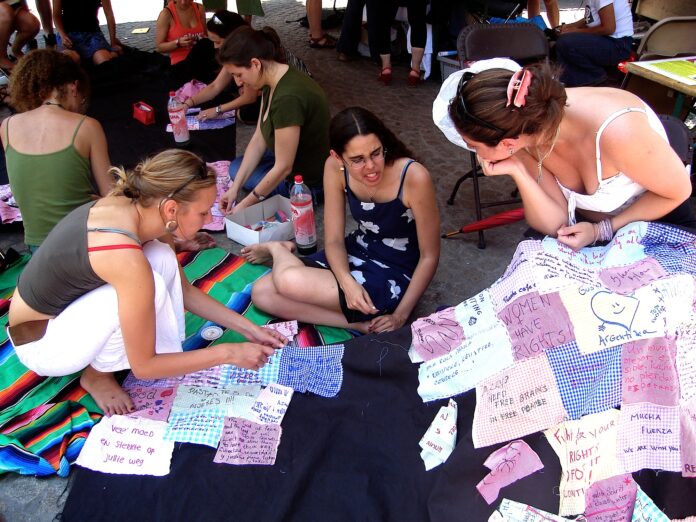One woman’s quest to publicize femicide in Central America — through hip-hop
The Mayan women and girls of Guatemala in their traditional clothing bring vibrant color to the streets. Their lovely bronze skin glows along with their smiles, and their melodious voices brighten each city. I remember girls in their Sunday clothes, running and playing in Santiago Atitlán, and women hand-washing clothes together in the collective “pilas” in the center of Santa María de Jesús, as they chatted and laughed. I think of the women of San Juan La Laguna weaving cloth, bags and hammocks out of baby-soft cotton in their houses and shops to support themselves, and female artists proudly displaying their work at an art festival we visited in Guatemala City.
But life for Guatemala’s women isn’t always joyful. The country has the world’s third highest rate of femicide, or murder of women, because of their gender. There have been more than 6,000 cases of women being tortured, mutilated or murdered since 2000, a number growing by one to two each day, according to the United Nations Commission on Human Rights. It’s so common that perpetrators enjoy impunity for their crimes against women — neither the police nor the government prioritize femicide. Patriarchal beliefs are embedded in the culture.
In Guatemala’s 2008-2009 National Maternal and Child Health Survey (ENSMI), 81.6 percent of men said that their wife or partner needed to ask his permission to leave the house. Nearly 60 percent said that they must ask to use contraceptives; 67 percent that women must ask permission to manage household money; and 77.8 percent that they needed to ask permission to work or study. Even during our visit to the Guadalupe Homes Orphanage, boys and girls were separated and, despite the language barrier, I could tell by the way the boys treated the girls that they had little interaction as equals: the boys tended to play energetic games and sports, while the girls kept to themselves, drawing and playing less active games, such as duck-duck-goose.
“Lately, there has been a lot of violence against feminists,” said Rebeca Lane, a renowned Guatemalan mestiza (a person of mixed white and Mayan ancestry) rapper, poet and sociologist, who tours internationally. But Lane’s roots are still in Guatemala City’s working class Zona 1 — and her lyrics focus on front-burner social issues at home.
Lane sat down to speak with our group in Guatemala City’s Pan American Hotel. She talked about everything from her identity, to the music industry, to human rights, but seemed shocked that we’d not heard about a horrific recent event.
“Women in Guatemala are going through tough times. Being Guatemalan, one part is that you love it, because it’s a very beautiful place, and there are beautiful communities and people. But at the same time, you hate it. I hate this place.” — Hip hop artist and activist Rebeca Lane
Girls at the government-run Virgen de la Asunción home for children in San José Pinula had fled the shelter, in an attempt to escape the horrible living conditions, and sexual abuse. But they were captured, and 56 of the girls were then locked in a room where a mysterious fire took most of their lives, on the night of March 8, 2017.
“It changed everything for us, for women especially, because it was small girls who were sold as sexual slaves,” Lane said. “And many of them weren’t rescued from the fire. So, we believe this fire was not an accident.”
Many feminists believe that the government killed those girls so they wouldn’t be able to speak about the abuse going on in that shelter, Lane stated. And, even months later, those speaking out about the tragic event are receiving death threats. Shots were fired at the home of a lawyer working on the case, and just two days before, an activist supporting the families of the victims was kidnapped, tortured and raped.
Though Lane loves her home, she can’t support the patriarchal views embedded in the culture. There’s always this hope of “things are going to get better,” she says, but they never do.
“Women in Guatemala are going through tough times,” she said. “Being Guatemalan, one part is that you love it, because it’s a very beautiful place, and there’s beautiful communities and people. But at the same time, you hate it. I hate this place.”
“There’s this word very much used in Spanish, it’s called “feminazi,” Rebeca told us, as she began talking about the social impact of being a feminist in Guatemala. We all nodded knowingly — “feminazi” is not an uncommon term in the United States, either. “Okay, so tell me where we [feminists] are building our concentration camps?! Why is my opinion equated with Nazi genocide?”
Lane is also a sociologist, and received her degree from the University of San Carlos in Guatemala City. The university is also home to Guatemala’s (and Latin America’s) only feminist radio program, Voces de Mujeres (Women’s Voices), founded in the early 1980s by sociologist Dr. Silvia Monzón, who is also on the editorial board of the country’s only feminist newspaper, La Cuerda (“The Cord.”)
Dr. Monzón spoke about her experiences, and the struggles she first faced to create a space for women a quarter of a century ago, with her son translating. She described how difficult it was, and how much opposition from both men and women she has met with, over the years. But she takes everything in stride. She jokes that there are three feminist men in Guatemala: her husband and her two sons.
While Lane was influenced by the work of Dr. Monzón, the professor noted that Lane had in fact influenced her.
Lane’s observations resonate across cultural boundaries. Maybe that’s why her music has become so popular — of course it’s catchy, and it discusses Guatemalan social issues, but those issues are omnipresent globally. They cross borders, and with her experience as a mestiza woman of mixed race, her college education (making her a rare minority in the country), and her inspiring discourse, Rebeca knows how to cross borders.
The sociologist Silvia Monzón, who founded Guatemala’s only feminist radio program, jokes that there are three feminist men in Guatemala: her husband and her two sons.
“I’m not going to lecture you [on gender oppression]. I’m not going to give you classes. I charge for that,” she joked, discussing how she talks to anti-feminists, both men and women, who come from a place of privilege. “Over here, many of the guys and girls in hip-hop haven’t had the privilege to have these discussions in an educational setting. So, I understand that maybe this is the first time they’re gonna hear about it — I have to be very loving and caring [in raising their consciousness]. I cannot be as confrontational as I am to wealthy white college boys [who show ignorance about gender inequality].”
And it’s usually those white college boys who are hostile to feminism, she noted. Lane is more patient with her compatriots who haven’t had formal education, which, sadly, is most Guatemalans. In metropolitan areas, the average education level is eight years — twice that of rural areas. For indigenous women, that falls to three years. The country has made some progress — while only 12 percent of the population attends college, now more women graduate than men — but urban-rural disparities persist.
“When guys wouldn’t let us into their hip hop shows, we were like, ‘We’re not gonna sit here and wimp out, because they’re not letting us in!’” Lane said. “I’m not going to sit here crying or fighting with you. I’m going to do my stuff.”
And she does. Lane and other Guatemalan female rappers started their own hip hop shows, which ultimately gained more international recognition than the male rappers’ performances did. Lane is creating her own space — and she’s sharing it with women who need it.

